- Home
- Rick Yancey
The Seal of Solomon Page 2
The Seal of Solomon Read online
Page 2
“What’s going on?” I asked.
“Oh, Alfred, the most extraordinary thing—” Betty began, but Horace cut her off.
“Nothing!” he shouted. He gave an embarrassed little laugh and clapped my shoulder hard. He lowered his voice.
“Just a little spring-cleaning, Ally my boy. Is it all right if I call you ‘Ally’?”
“No,” I said. “And this is October.”
“No time like the present!” Horace bellowed.
Just then Kenny walked into the room, muttering, “Oh, Al. Al Kropp. Alfred Kropp.”
Horace whirled on him and shouted, “Zip your pie-hole, you pea-brained little halfwit!” and Betty murmured, “Horace, you’ll give him a complex.” Horace yelled back, “Little late for that!”
“Lay off Kenny,” I said, and that shut Horace up.
“Dear,” Betty said to Horace. “Maybe we should tell Alfred.” She turned to me. “We’re having a visitor today.”
“Who is it?” I asked.
“No one you know,” Horace said. “Here, Al, let me take that backpack for you . . . Dear God, it’s heavy—you’re as strong as Paul Bunyan’s ox! How about that? You learn about Paul Bunyan in school? Kenny, put this away for Al.”
Horace slung the backpack in Kenny’s direction. It slammed into his stomach, and Kenny went down on his butt.
“That’s okay,” I said. “I’ll take it.”
I grabbed the backpack with one hand, Kenny’s arm with the other, and pulled him to his feet.
“Thank you,” he gasped.
The doorbell rang. All the color drained from Horace’s face and he whirled on Betty, one of his stubby fingers jabbing at her nose.
“Great, he’s here and I haven’t dusted the mantel yet!”
“Who’s here?” I asked.
“The visitor,” Horace said. He was struggling with the knot in the apron strings.
“What visitor?”
“Didn’t we cover this? Betty, go get me a pair of scissors so I can cut off this damn apron . . .”
“I told you to tie it in a bow.” She bit her lip and worked at the knot behind Horace’s back. The doorbell rang again. Nobody moved. Horace waved the feather duster around in a figure eight. He reminded me of a fat, round majorette, though you don’t see many majorettes with his body type. Little dust motes danced and darted in the air. Horace snapped at Betty to never mind and put the broom away. The doorbell rang a third time.
“You want me to get that?” I asked.
“No!” said Horace and Betty at the same time.
Then Horace said, “Al, you take the sofa, but don’t sit in the middle. Betty, put the coffee on and do something with your hair. You look like Ozzy Osbourne. Far end of the sofa, Al, you smell sweaty. Kenny, why are you standing there gasping like a guppy? Get outta here.”
Horace pulled the backpack from my hand and shoved it back into Kenny’s arms. Kenny looked at me and I nodded to him that it was all right, though I really wasn’t sure that it was. Kenny left, staggering under the weight. Betty disappeared into the kitchen while Horace tore the apron off.
“Sit, Al,” Horace hissed. “Act natural! Stick this under the sofa.” He handed me the wadded-up apron and I shoved it under the sofa before I sat down.
Horace flung open the door to reveal Mr. Baby-Face, a thin black briefcase in his hand and a puzzled expression on his chubby face.
“Is this the Tuttle residence?” he asked.
“You bet your sweet aunt Matilda it is!” Horace said. “Come on in. Take a load off.”
He had remembered the feather duster at the last second, hiding it behind his back as he waved the guy toward the family room.
“I’m Horace,” he said. “My wife, Betty, is in the kitchen, brewing.”
“Brewing?”
“Coffee. Decaf. Want some?”
“No, thank you, but perhaps a glass of water. It’s very warm for October, don’t you think?”
“Hot as Africa,” Horace said.
The bald guy had come into the family room. Horace trotted after him.
“And here he is,” Horace said. “Here is Alfred Kropp.”
“I know who Alfred Kropp is,” the bald guy said, smiling at me. He had very small teeth with sharp incisors, like a ferret, though I’ve never really studied a ferret’s mouth. He offered his hand and I took it without getting up. His hand was moist and soft.
“My name is Alphonso Needlemier, Alfred,” he said.
“What a pleasure it is to finally meet you.”
Behind him, Horace turned and shouted toward the kitchen, “Betty! Nix the coffee and bring us some ice water!”
“No ice,” Alphonso Needlemier said.
“Nix the ice!”
“But chilled, of course.”
“Chill it!” Horace yelled over his shoulder. “Take a load off, Mr. Needleman.”
“Mier,” the bald guy said.
“Mier?”
“Needlemier.”
Mr. Needlemier sat on the opposite end of the sofa and placed his briefcase on his lap. Horace sank into the lounger and tossed the feather duster behind the chair.
“You’ve been following me,” I said to Mr. Needlemier.
“I have.”
“Why?”
“Mostly to satisfy my own curiosity.”
“That killed the cat,” Horace said. “But who likes cats?” He yelled, “Betty! Water!” He smiled apologetically at Mr. Needlemier.
“The resemblance is not striking, but evident,” Mr. Needlemier said.
“The resemblance to what?” I asked.
“To Mr. Samson, of course.”
Just then Betty came into the room carrying a tray with three glasses of water. She had pulled her hair back into a bun, but some strands had come loose and hung down on either side of her face. Mr. Needlemier took a glass of water and thanked her. Horace glared.
“Coffee,” he said.
“You said nix the coffee.”
“Nix his coffee, not mine.”
Betty scurried back to the kitchen. Mr. Needlemier sipped his water and then set the glass on the coffee table.
“Alfred,” he said, “I am Bernard Samson’s personal attorney and executor of his estate.”
Alphonso Needlemier pulled a long white envelope from his coat pocket and held it toward me. It read: For Alfred Kropp in the event of my demise [signed] Bernard Samson.”
Below the signature were the words, in bold type, Personal and Confidential.
The flap was sealed in the old-fashioned way, with a glob of red wax imprinted with the image of a rider on a horse carrying a banner.
“I would have delivered this sooner, Alfred,” Mr. Needlemier said. “But I found it only two weeks ago while going through Mr. Samson’s papers. He was a very private man and I promise you I didn’t know of this letter’s existence.”
“Well, what are you waiting for, Al?” Horace said. His voice was shaking. “Open it!”
I slid my finger under the flap and tore the envelope open. Inside were two typewritten sheets of paper. Horace was leaning forward in the lounger. Mr. Needlemier studied me with a sad expression.
“Well?” Horace asked.
It read:
My dear Alfred,
If this letter finds you, then my time on earth has passed. Words cannot express my deep sorrow for not sharing the truth with you while I still drew breath. In time I hope you find it in your heart to forgive me (and your mother) for keeping your true identity a secret. I would have told you of your ancestry, but my journey has been cut short—such is the fate of one born into the line of the noblest of knights.
I pray on this, the eve of my final rendezvous with M. Mogart, that you have found a suitable home. If I have learned anything in my strange and secretive life, it is that Fortune often smiles in the darkest circumstance and it is when we reach that place between desperation and despair that we find hope. I know all too well how you must miss your mother and your u
ncle . . . I pray only that you understand that I have done everything within my power to see that you are kept safe, far from this dangerous business.
My dear son, I would have taken you in had I not believed doing so would have endangered you and your mother. Forgive me! You are my son, and though I have gone, I remain always your father.
Bernard Samson
I read the letter twice, then I folded it carefully, returned it to the envelope, and set the envelope on the little end table by the sofa.
Nobody said anything for a long time. Mr. Needlemier was looking kindly at me. Horace was glaring.
“Well—what’s it say?” he demanded in a loud voice.
“It is a privileged communication, Mr. Tuttle,” Mr.
Needlemier said.
“And I’m his guardian. Practically family. Nearly a father!”
“Not even close,” I told him.
Betty came back into the room carrying a cup of coffee.
“Oh, Alfred!” she said. “I completely forgot about you! What would you like, dear?”
“Maybe just a glass of water.”
She left again and Horace gave an exaggerated roll of his eyes. “You married?” he asked Mr. Needlemier. Mr. Needlemier didn’t say anything. He was still looking at me. “Good thing!” Horace said, which covered either possibility.
Mr. Needlemier flipped the gold clasps on his briefcase. Horace gave a little jump at the sharp snapping sound.
“There is one other matter we should discuss, Alfred,” Mr.
Needlemier said. “As I mentioned, I am executor to Mr. Samson’s estate.” He pulled a legal-sized folder from the briefcase. He tapped it with his pudgy index finger. “Alfred, his will names you as sole beneficiary.”
“What does that mean?” I asked.
“That means you are due to inherit control over Samson Industries and his entire personal fortune valued at . . .” Mr. Needlemier glanced at the papers in the folder. “Yes, four hundred million dollars—give or take a million.”
3
A glass shattered and everybody jumped. Betty had come into the room with my water, and when Mr. Needlemier said “four hundred million dollars,” the glass slipped from her hand and smashed on the floor. She ran into the kitchen for a towel to clean up the water and broken glass.
All the color had drained from Horace’s face. He reminded me of a middle-aged Casper the Friendly Ghost.
“Naturally, as is usually the case in these matters, you are not due to gain control of the money until you reach the age of eighteen,” Mr. Needlemier said. “Until then a trustee will manage your inheritance.”
“A trustee?” I asked.
“Trustee,” Horace whispered.
“Someone to look over your financial concerns. A guardian of your interests, as it were.”
“Who’s the trustee?” I asked.
“Who? Yeah, who’s the who?” Horace whispered.
“Unfortunately, the will does not designate a trustee. That choice falls to me, as executor.”
“So who’s it gonna be?” Horace asked.
Just then Betty came back with a towel and a whisk broom, saying, “Oh, don’t you hate breaking a glass? You never can get all the little pieces and when they get in your foot—”
“So let’s stop the pussyfooting around, Mr. Needlehiemer,” Horace said. “Who’s the trustee?”
Mr. Needlemier stared at Horace for a second. “I haven’t decided.”
“You haven’t decided?”
Mr. Needlemier shook his head. “That is one of the reasons I’m here.” He turned back to me. “I want to know Alfred’s wishes.”
“Alfred’s wishes?” Horace asked. “Alfred’s wishes! You’re telling me you’re gonna let a kid—and, forgive me here, Al, but a kid with not much wattage in the brains department— decide who manages four hundred million dollars?”
“Actually,” Mr. Needlemier said, “the figure is closer to a billion dollars, if you include the assets of Samson Industries.”
Horace’s mouth came open but no sound came out, as if the word “billion” had sucked all the air out of him.
“I’ll have to think about it,” I said.
“Of course,” Mr. Needlemier said. “It’s a great deal to think about.”
Horace got some of his breath back and whispered hoarsely, “I’ll help him. Alfred. Think about it. Al’ll need my help with that. The thinking.”
“Alfred means the world to us!” Betty called from the kitchen doorway.
“I was saving the news for a big surprise,” Horace told Mr. Needlemier. “But I guess this is a red-letter day for big surprises. See, Betty’s right; the kid means the world to us and funny thing is, Mr. Needlemanner, we’ve talked to our lawyer to get the ball rolling.”
“What ball?” I asked.
“We’re adopting you, Alfred, you adorable big-headed lug.”
4
Mr. Needlemier gave me his card and said he’d be in touch in a couple of weeks. He told me he was sorry for my loss. I didn’t know if he knew about my father being the head of a secret order of knights charged with protecting Excalibur, the Sword of King Arthur, so I decided not to mention it to him. I didn’t have the chance, though, even if I wanted to, because Horace was hovering right next to him from the time he stood up till the good-byes at the front door.
After Mr. Needlemier left, Horace barked at Betty to stop sweeping and vacuuming and running a wet cloth over the floor where the glass broke, and get started on dinner.
“We’re making your favorite, Al,” he told me. “Steak and potatoes!”
“That’s not my favorite,” I said.
“What do you mean that’s not your favorite?” he snapped, then caught himself and said, “Then you name it, Al, whatever you want!”
“I’m not hungry,” I said, and I went to my room and closed the door.
Kenny was lying on the top bunk in semidarkness; the blinds were drawn. He muttered softly above me as I stretched out on the bottom bunk, trying to wrap my Kropp brain around the fact that I was now a billionaire.
Kenny whispered, “What are you doing, Kropp?”
“Trying to figure out how I’m going to avoid becoming Horace Tuttle’s son. What are you doing, Kenny?”
“Nothing, Alfred Kropp.”
I rolled onto my stomach and glanced under the bed. I flopped back over and said, “All right, Kenny, give it back.”
“Give what back?”
“You know what.”
After a second I could see the faint light gleaming off the black metal of the blade as he lowered my sword from the top bunk. I knew it was very sharp, so I took it from Kenny carefully. “I told you not to touch it,” I said as I held it against my chest.
“I’m sorry, Alfred Kropp. Please don’t be mad at me.”
I was running my fingertips along the flat smooth part of the black sword. “Don’t bother it anymore, okay?” I said.
“Okay, Alfred Kropp.”
I slid the sword beneath the bed. When I first got back from London, I took Bennacio’s sword from its hiding place under my bed every day. But as the months went by I took it out less and less. Looking at it created this hollow feeling in my chest. The last time Bennacio wielded this sword it was in defense of the whole world, and now it was just a keepsake. I imagined myself as an old man showing it to the neighborhood kids and croaking, “Look at this, boys! You know what this is? This is the sword of the last knight who ever walked the earth, the bravest man I ever knew.” And they would probably laugh and run away from crazy ol’ Kropp with his tall tales of magic swords and doomed knights and the singing of angels.
“What are you thinking about, Kropp?” Kenny whispered above me.
“What would you do, Kenny, if you just found out you’re going to inherit a billion dollars and Horace Tuttle has plans to adopt you so he can get his hands on it?”
Kenny was silent for a while, thinking about it, I guess.
“I would
run away, Alfred Kropp.”
“Exactly,” I said.
5
I didn’t run away that night. Or the next night. Or the night after that. The last time I ran away from Knoxville I left with just the clothes on my back and no planning whatsoever (at least on my part), so this time I was determined not to leave without some clean socks and underwear and a firm destination in mind.
A couple of days after Mr. Needlemier’s visit, Horace informed me a court hearing had been scheduled to hear the merits of his petition to make me Horace Tuttle Jr. Then he proceeded to shower me with gifts. He bought me an iPod, clothes, and a cell phone. He started calling me “my boy,” as in, “Good morning, Alfred, my boy!” When he wasn’t following me around like a puppy desperate for attention, he and Betty were out house hunting, mostly in the fancier neighborhoods in Knoxville. I knew I had to escape from the Tuttles as soon as possible.
Still, I couldn’t think of a single place I would run to or what I would do once I got there. England was a possibility: since my father had come from there, I figured there must be relatives around, but I couldn’t imagine myself just showing up at their door and announcing, “Hi there! I’m your cousin Kropp!”
On my way to the bus one afternoon, I got seriously Kropped. Four football players jumped me, ripped my backpack from my shoulder, and knocked me upside the head with it a couple times. They took off, leaving me rolling in the grass.
I heard a girl’s voice above me.
“Hey, are you all right?”
I peeked at her through my fingers. Blond hair. Blue eyes. Tan.
“You’re Alfred Kropp, aren’t you?”
I nodded.
“I’m Ashley.”
She had a round face and blue eyes—very blue, maybe the bluest eyes I had ever seen, big too, about the size of quarters.
She sat down beside me. We watched as my bus pulled from the curb, belching black smoke.
“Wasn’t that your bus?” she asked.
I nodded.
“You need a ride?”
I nodded again. Nodding made my head hurt.
“Come on. I’m parked right over there.”
I followed her to the car, a bright yellow Mazda Miada convertible. I dropped my backpack into the tiny backseat and climbed in.

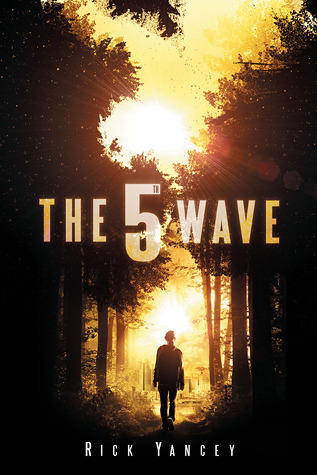 The 5th Wave
The 5th Wave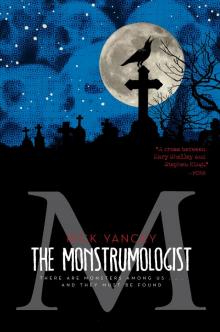 The Monstrumologist
The Monstrumologist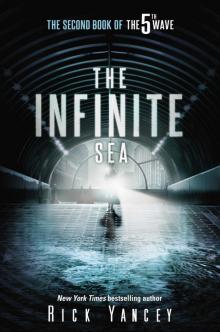 The Infinite Sea
The Infinite Sea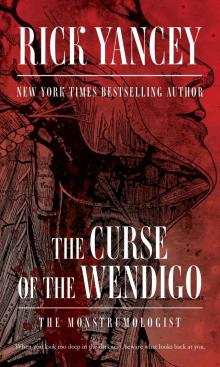 The Curse of the Wendigo
The Curse of the Wendigo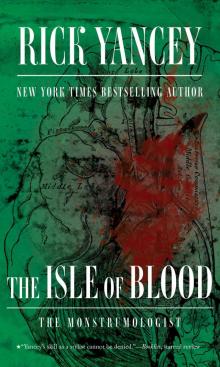 The Isle of Blood
The Isle of Blood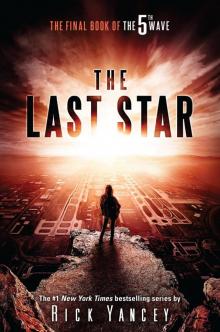 The Last Star
The Last Star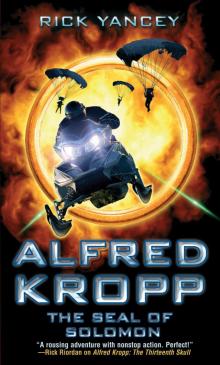 The Seal of Solomon
The Seal of Solomon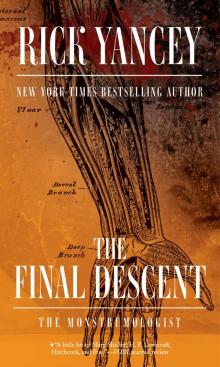 The Final Descent
The Final Descent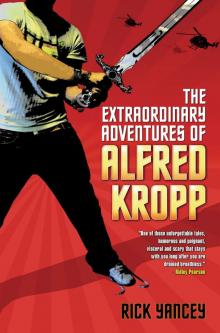 The Extraordinary Adventures of Alfred Kropp
The Extraordinary Adventures of Alfred Kropp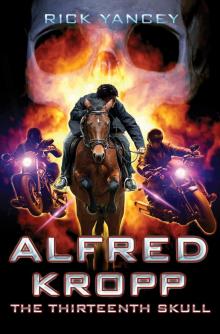 The Thirteenth Skull
The Thirteenth Skull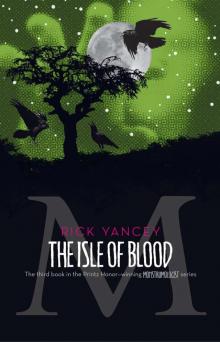 The Isle of Blood (Monstrumologist)
The Isle of Blood (Monstrumologist)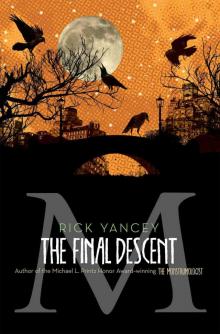 The Final Descent (The Monstrumologist)
The Final Descent (The Monstrumologist)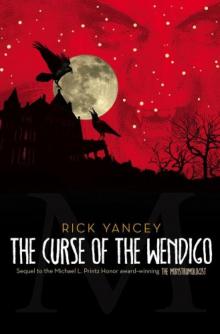 The Curse of the Wendigo (The Monstrumologist, Book 2)
The Curse of the Wendigo (The Monstrumologist, Book 2)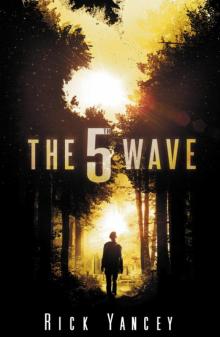 The 5th Wave t5w-1
The 5th Wave t5w-1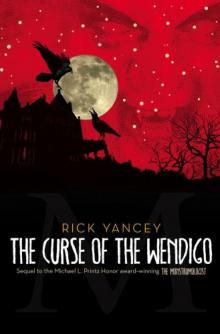 The Curse of the Wendigo (The Monstrumologist, Book 2) m-2
The Curse of the Wendigo (The Monstrumologist, Book 2) m-2